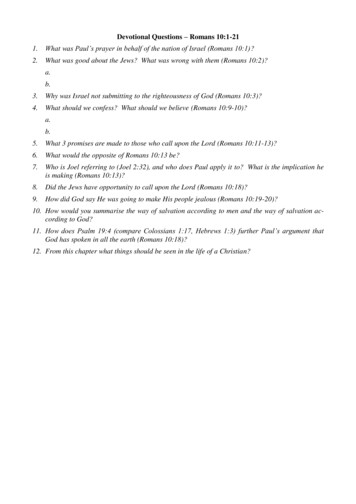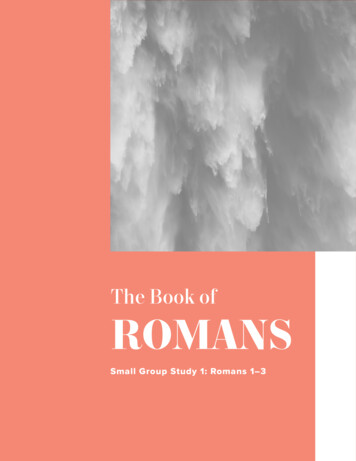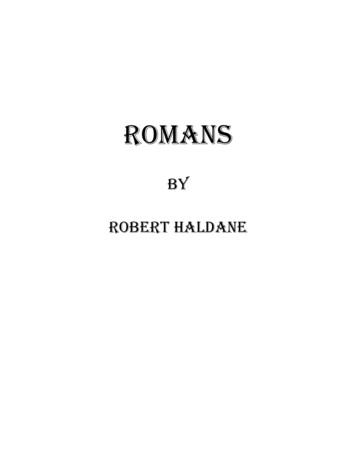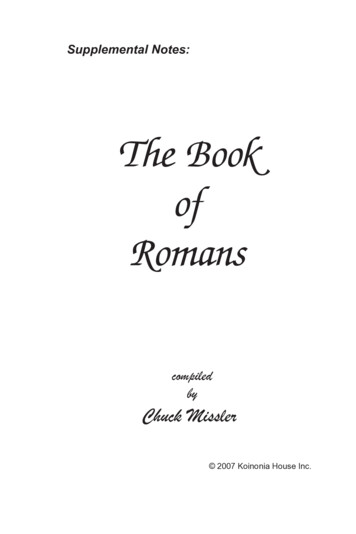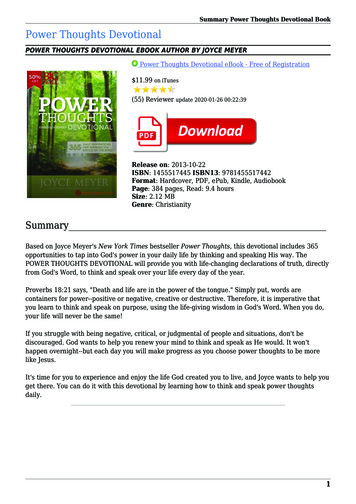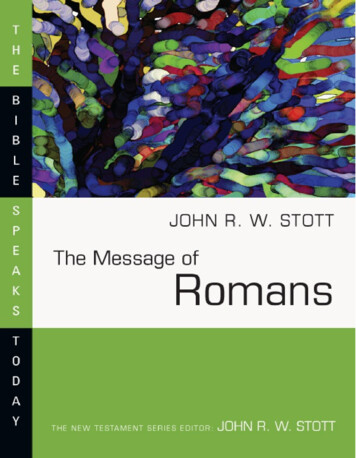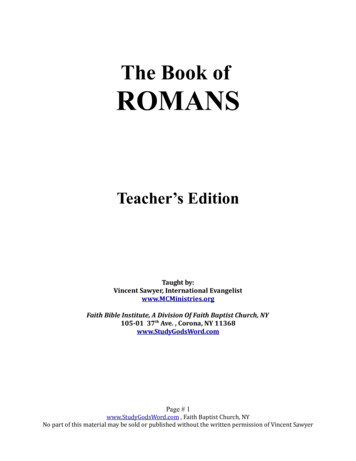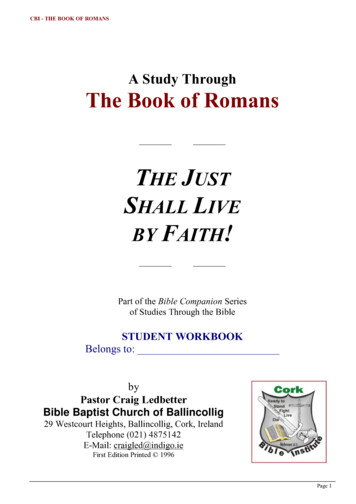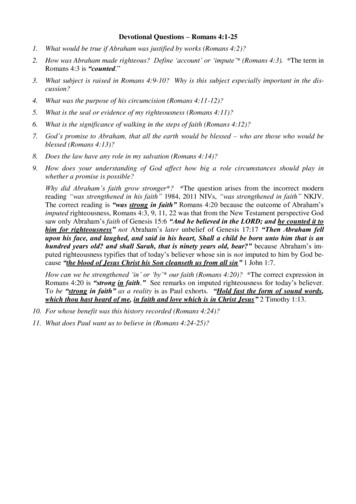
Transcription
Devotional Questions – Romans 4:1-251.What would be true if Abraham was justified by works (Romans 4:2)?2.How was Abraham made righteous? Define ‘account’ or ‘impute’* (Romans 4:3). *The term inRomans 4:3 is “counted.”3.What subject is raised in Romans 4:9-10? Why is this subject especially important in the discussion?4.What was the purpose of his circumcision (Romans 4:11-12)?5.What is the seal or evidence of my righteousness (Romans 4:11)?6.What is the significance of walking in the steps of faith (Romans 4:12)?7.God’s promise to Abraham, that all the earth would be blessed – who are those who would beblessed (Romans 4:13)?8.Does the law have any role in my salvation (Romans 4:14)?9.How does your understanding of God affect how big a role circumstances should play inwhether a promise is possible?Why did Abraham’s faith grow stronger*? *The question arises from the incorrect modernreading “was strengthened in his faith” 1984, 2011 NIVs, “was strengthened in faith” NKJV.The correct reading is “was strong in faith” Romans 4:20 because the outcome of Abraham’simputed righteousness, Romans 4:3, 9, 11, 22 was that from the New Testament perspective Godsaw only Abraham’s faith of Genesis 15:6 “And he believed in the LORD; and he counted it tohim for righteousness” not Abraham’s later unbelief of Genesis 17:17 “Then Abraham fellupon his face, and laughed, and said in his heart, Shall a child be born unto him that is anhundred years old? and shall Sarah, that is ninety years old, bear?” because Abraham’s imputed righteousness typifies that of today’s believer whose sin is not imputed to him by God because “the blood of Jesus Christ his Son cleanseth us from all sin” 1 John 1:7.How can we be strengthened ‘in’ or ‘by’* our faith (Romans 4:20)? *The correct expression inRomans 4:20 is “strong in faith.” See remarks on imputed righteousness for today’s believer.To be “strong in faith” as a reality is as Paul exhorts. “Hold fast the form of sound words,which thou hast heard of me, in faith and love which is in Christ Jesus” 2 Timothy 1:13.10. For whose benefit was this history recorded (Romans 4:24)?11. What does Paul want us to believe in (Romans 4:24-25)?
2Devotional Questions – Romans 4:1-25, Answers to QuestionsSee Dr Ruckman’s commentary The Book of Romans pp 152-194 and the Ruckman Reference Biblepp 1242, 1457, 1489-1491, 1568 for detailed comment.1.What would be true if Abraham was justified by works (Romans 4:2)?Romans 4:2 states “For if Abraham were justified by works, he hath whereof to glory; but notbefore God.”It would mean that Abraham would have risen to the challenge that God issues in His answer toJob but that would be futile as God declares through Isaiah.“Cast abroad the rage of thy wrath: and behold every one that is proud, and abase him.Thenwill I also confess unto thee that thine own right hand can save thee” Job 40:11, 14.“I, even I, am the LORD; and beside me there is no saviour” Isaiah 43:11.Today’s believer should therefore remember Peter’s declaration.“Neither is there salvation in any other: for there is none other name under heaven givenamong men, whereby we must be saved” Acts 4:12.2.How was Abraham made righteous? Define ‘account’ or ‘impute’* (Romans 4:3). *The term inRomans 4:3 is “counted.”Romans 4:3 states “For what saith the scripture? Abraham believed God, and it was countedunto him for righteousness.”The scripture cited in Genesis 15:6 “And he believed in the LORD; and he counted it to himfor righteousness.”God bestowed righteousness on Abraham for believing what God said but note what it was thatGod said that Abraham believed.“And he brought him forth abroad, and said, Look now toward heaven, and tell the stars, ifthou be able to number them: and he said unto him, So shall thy seed be” Genesis 15:5.Abraham’s belief in what God said, Genesis 15:5-6, pictures believing on the Lord Jesus Christfor salvation, Acts 16:31 but it is not the same. Abraham never received what today’s believerreceives in salvation through Christ, in which he can truly rejoice, as Paul explains.“In whom ye also trusted, after that ye heard the word of truth, the gospel of your salvation:in whom also after that ye believed, ye were sealed with that holy Spirit of promise, Which isthe earnest of our inheritance until the redemption of the purchased possession, unto thepraise of his glory” Ephesians 1:13-14.Moreover, note that at death Abraham went to “Abraham’s bosom” Luke 16:22 “in the heart ofthe earth” Matthew 12:40 where he remained with the other deceased Old Testament saints until the Lord Jesus Christ liberated them and took them to heaven with His resurrection “Wherefore he saith, When he ascended up on high, he led captivity captive.” Ephesians 4:8.Today’s believer does not go to Abraham’s bosom at death but direct to “the third heaven” 2Corinthians 12:2 with Acts 14:19, 20, showing that Abraham and today’s believer were notsaved the same way and that, as indicated, Abraham’s belief in what God said, Genesis 15:5-6,pictures believing on the Lord Jesus Christ for salvation, Acts 16:31 but it is not the same. Pauldescribes what happens to today’s believer at death.“For we know that if our earthly house of this tabernacle were dissolved, we have a buildingof God, an house not made with hands, eternal in the heavens” 2 Corinthians 5:1.See additional study Definition of “counted” and associated terms for the definition of“counted” Romans 4:3 with respect to today’s believer and these extracts.
3Grievous Wolf’s self-imposed perplexity appears to centre on the expressions “counted unto,”“reckoned to,” “imputed to” and “accounted to.” Wolf seems to think that the expressionsshould all be the same, e.g. “credited to” NIV, TNIV or “accounted to” NKJV.By contrast, the Bible believer consults his final authority and asks “For what saith the scripture?” Romans 4:3.Taking the expressions in turn, therefore, “the scripture” reveals the expression “counted unto”is found twice more in scripture, besides in Romans 4:3, in Numbers 18:30 and Psalm 106:31.Note the under-linings.“Therefore thou shalt say unto them, When ye have heaved the best thereof from it, then itshall be counted unto the Levites as the increase of the threshingfloor, and as the increase ofthe winepress” Numbers 18:30. See also Numbers 18:29.“Out of all your gifts ye shall offer every heave offering of the LORD, of all the best thereof,even the hallowed part thereof out of it.”“And that was counted unto him for righteousness unto all generations for evermore” Psalm106:31. See also Psalm 106:30.“Then stood up Phinehas, and executed judgment: and so the plague was stayed.”See Numbers 25:7-11, where in Numbers 25:11 the Lord testifies that “Phinehas, the son ofEleazar, the son of Aaron the priest, hath turned my wrath away from the children of Israel.”That “righteousness” which is “counted unto” the individual from the Lord is “all the bestthereof, even the hallowed part thereof.” It is “everlasting righteousness” Daniel 9:24 “untoall generations for evermore” that “hath turned my wrath away from” the individual throughGod having “executed judgment” on the Lord Jesus Christ, 2 Corinthians 5:19-21. See especially 2 Corinthians 5:21.“For he hath made him to be sin for us, who knew no sin; that we might be made the righteousness of God in him”.Therefore, in sum, “the gift of God” [Ephesians 2:8] that is identical to “righteousness.imputed” [Romans 4:11] to the believer is: “counted unto” the believer as the best gift, the hallowed gift and the everlasting gift ofGod’s righteousness that turns away God’s wrath from the believer. “reckoned to” the believer as the restorative gift that returns him to a lost former state ofinnocence and bestows even more upon him by means of a new standing in God’s righteousness and as the established gift underwritten by God Himself. “imputed to” the believer as the doubly blessed gift for him that bestows God’s righteousness on the recipient and his sin on the Lord Jesus Christ. “accounted to” the believer as the royal gift and the abundant gift by which the recipientof God’s righteousness thereby draws from an inexhaustible and ever-current account ofGod’s righteousness.“Thanks be unto God for his unspeakable gift” 2 Corinthians 9:15.
43.What subject is raised in Romans 4:9-10? Why is this subject especially important in the discussion?Romans 4:8-10 state “Blessed is the man to whom the Lord will not impute sin. Cometh thisblessedness then upon the circumcision only, or upon the uncircumcision also? for we saythat faith was reckoned to Abraham for righteousness. How was it then reckoned? when hewas in circumcision, or in uncircumcision? Not in circumcision, but in uncircumcision.”The subject is the blessedness of non-imputed sin for both Jew and Gentile. Paul emphasisesthis blessedness later in his letter. Today’s believer should exhort all to receive this blessedness.“For there is no difference between the Jew and the Greek: for the same Lord over all is richunto all that call upon him. For whosoever shall call upon the name of the Lord shall besaved” Romans 10:12-13.4.What was the purpose of his circumcision (Romans 4:11-12)?Abraham’s circumcision was confirmation of his imputed righteousness from God and in turn itpictures “the circumcision of Christ” that is central to the imputed righteousness of today’s believer as Paul explains.“And ye are complete in him, which is the head of all principality and power: In whom also yeare circumcised with the circumcision made without hands, in putting off the body of the sinsof the flesh by the circumcision of Christ: Buried with him in baptism, wherein also ye arerisen with him through the faith of the operation of God, who hath raised him from the dead.And you, being dead in your sins and the uncircumcision of your flesh, hath he quickened together with him, having forgiven you all trespasses” Colossians 2:10-13.Therefore as Paul exhorts for today’s believer “Likewise reckon ye also yourselves to be deadindeed unto sin, but alive unto God through Jesus Christ our Lord” Romans 6:11.5.What is the seal or evidence of my righteousness (Romans 4:11)?See Question 2 and this extract.Abraham never received what today’s believer receives in salvation through Christ, in which hecan truly rejoice, as Paul explains.“In whom ye also trusted, after that ye heard the word of truth, the gospel of your salvation:in whom also after that ye believed, ye were sealed with that holy Spirit of promise, Which isthe earnest of our inheritance until the redemption of the purchased possession, unto thepraise of his glory” Ephesians 1:13-14.6.What is the significance of walking in the steps of faith (Romans 4:12)?The significance of being one of those “who also walk in the steps of that faith of our fatherAbraham” Romans 4:12 is for today’s believer eternal security bestowed by “the holy Spirit ofGod, whereby ye are sealed unto the day of redemption” Ephesians 4:30 typified by Abraham’scertainty that what God said to him would come to pass, a good ensample of the exercise of “thefaith of our Lord Jesus Christ” James 2:1 for today’s believer. Note that Abraham’s “walk inthe steps of that faith” was steadfast according to the statement below, just as today’s believersshould be noteworthy for “the stedfastness of your faith in Christ” Colossians 2:5.“He staggered not at the promise of God through unbelief; but was strong in faith, givingglory to God; And being fully persuaded that, what he had promised, he was able also to perform” Romans 4:20-21.
57.God’s promise to Abraham, that all the earth would be blessed – who are those who would beblessed (Romans 4:13)?God told Abraham who would be blessed. “And I will bless them that bless thee, and cursehim that curseth thee: and in thee shall all families of the earth be blessed” Genesis 12:3.Paul explains how that promise of God has been implemented, availed of by today’s believer butavailable to all.“Christ hath redeemed us from the curse of the law, being made a curse for us: for it is written, Cursed is every one that hangeth on a tree: That the blessing of Abraham might come onthe Gentiles through Jesus Christ; that we might receive the promise of the Spirit throughfaith” Galatians 3:13-14.“For therefore we both labour and suffer reproach, because we trust in the living God, who isthe Saviour of all men, specially of those that believe” 1 Timothy 4:10.8.Does the law have any role in my salvation (Romans 4:14)?Not directly, only in the sense of pointing to “the salvation which is in Christ Jesus” 2 Timothy2:10 as Paul explains.“Wherefore the law was our schoolmaster to bring us unto Christ, that we might be justifiedby faith. But after that faith is come, we are no longer under a schoolmaster. For ye are allthe children of God by faith in Christ Jesus” Galatians 3:24-26.9.How does your understanding of God affect how big a role circumstances should play inwhether a promise is possible?Both hinge upon “the will of God” with respect to God’s preferred will and with respect to today’s believers “the stedfastness of your faith in Christ” Colossians 2:5 as Paul explains.“For ye have need of patience, that, after ye have done the will of God, ye might receive thepromise” Hebrews 10:36.Why did Abraham’s faith grow stronger*? *The question arises from the incorrect modernreading “was strengthened in his faith” 1984, 2011 NIVs, “was strengthened in faith” NKJV.The correct reading is “was strong in faith” Romans 4:20 because the outcome of Abraham’simputed righteousness, Romans 4:3, 9, 11, 22 was that from the New Testament perspective Godsaw only Abraham’s faith of Genesis 15:6 “And he believed in the LORD; and he counted it tohim for righteousness” not Abraham’s later unbelief of Genesis 17:17 “Then Abraham fellupon his face, and laughed, and said in his heart, Shall a child be born unto him that is anhundred years old? and shall Sarah, that is ninety years old, bear?” because Abraham’s imputed righteousness typifies that of today’s believer whose sin is not imputed to him by God because “the blood of Jesus Christ his Son cleanseth us from all sin” 1 John 1:7.How can we be strengthened ‘in’ or ‘by’* our faith (Romans 4:20)? *The correct expression inRomans 4:20 is “strong in faith.” See remarks on imputed righteousness for today’s believer.To be “strong in faith” as a reality is as Paul exhorts. “Hold fast the form of sound words,which thou hast heard of me, in faith and love which is in Christ Jesus” 2 Timothy 1:13.10. For whose benefit was this history recorded (Romans 4:24)?The history that Paul now reviews was recorded in particular for all who would take Paul seriously in Romans 15:4 “For whatsoever things were written aforetime were written for ourlearning, that we through patience and comfort of the scriptures might have hope.”11. What does Paul want us to believe in (Romans 4:24-25)?The fulfilment of “the promises of God” as Abraham did. See Question 6 and Romans 4:20-21,as Paul exhorts. “For all the promises of God in him are yea, and in him Amen, unto the gloryof God by us” 2 Corinthians 1:20.
6Definition of “counted” and associated termsSee divietro-and-dawaite.php Answers to theWolf Man Part 1 pp 19-23.23. Why would KJV translators render Gen 15:6 which is quoted in identical Greek form by Paul inRom 4:3, 9, 22; Gal 3:6, in FOUR DIFFERENT WAYS? Why are they creating distinctionswere none exist?Wolf fails to mention any problems that arise as a result of the differences about which he complains. He is gnat-straining again, Matthew 23:24. See Question 10.The general answer to Wolf’s complaint is given by the King James translators themselves, inThe Translators to the Reader. See watch.pair.com/thesis.html.“Another things we think good to admonish thee of (gentle Reader) that we have not tied ourselves to an uniformity of phrasing, or to an identity of words, as some peradventure would wishthat we had done, because they observe, that some learned men somewhere, have been as exactas they could that way. Truly, that we might not vary from the sense of that which we had translated before, if the word signified that same in both places (for there be some words that be notthe same sense everywhere) we were especially careful, and made a conscience, according toour duty. But, that we should express the same notion in the same particular word; as for example, if we translate the Hebrew or Greek word once by PURPOSE, never to call it INTENT; ifone where JOURNEYING, never TRAVELING; if one where THINK, never SUPPOSE; if onewhere PAIN, never ACHE; if one where JOY, never GLADNESS, etc. Thus to mince the matter,we thought to savour more of curiosity than wisdom, and that rather it would breed scorn in theAtheist, than bring profit to the godly Reader. For is the kingdom of God to become words orsyllables? why should we be in bondage to them if we may be free, use one precisely when wemay use another no less fit, as commodiously?”Again, it is up to Wolf to show that the King’s men were either imprecise or incommodious intheir choice of words for Romans 4:3, 9, 22, Galatians 3:6. He fails totally in that respect.The wording that the King’s men chose for Romans 4:3, 9, 22, Galatians 3:6 is actually beneficial to the reader, regardless of ‘the Greek.’Genesis 15:6 states “And he believed in the LORD; and he counted it to him for righteousness.”Romans 4:3 states “For what saith the scripture? Abraham believed God, and it was countedunto him for righteousness.”Romans 4:9 states “Cometh this blessedness then upon the circumcision only, or upon the uncircumcision also? for we say that faith was reckoned to Abraham for righteousness.”Romans 4:22 states “And therefore it was imputed to him for righteousness.”Galatians 3:6 states “Even as Abraham believed God, and it was accounted to him for righteousness.”Grievous Wolf’s self-imposed perplexity appears to centre on the expressions “counted unto,”“reckoned to,” “imputed to” and “accounted to.” Wolf seems to think that the expressionsshould all be the same, e.g. “credited to” NIV, TNIV or “accounted to” NKJV.By contrast, the Bible believer consults his final authority and asks “For what saith the scripture?” Romans 4:3.Taking the expressions in turn, therefore, “the scripture” reveals the expression “counted unto”is found twice more in scripture, besides in Romans 4:3, in Numbers 18:30 and Psalm 106:31.Note the under-linings.
7“Therefore thou shalt say unto them, When ye have heaved the best thereof from it, then itshall be counted unto the Levites as the increase of the threshingfloor, and as the increase ofthe winepress” Numbers 18:30. See also Numbers 18:29.“Out of all your gifts ye shall offer every heave offering of the LORD, of all the best thereof,even the hallowed part thereof out of it.”“And that was counted unto him for righteousness unto all generations for evermore” Psalm106:31. See also Psalm 106:30.“Then stood up Phinehas, and executed judgment: and so the plague was stayed.”See Numbers 25:7-11, where in Numbers 25:11 the Lord testifies that “Phinehas, the son ofEleazar, the son of Aaron the priest, hath turned my wrath away from the children of Israel.”That “righteousness” which is “counted unto” the individual from the Lord is “all the bestthereof, even the hallowed part thereof.” It is “everlasting righteousness” Daniel 9:24 “untoall generations for evermore” that “hath turned my wrath away from” the individual throughGod having “executed judgment” on the Lord Jesus Christ, 2 Corinthians 5:19-21. See especially 2 Corinthians 5:21.“For he hath made him to be sin for us, who knew no sin; that we might be made the righteousness of God in him.”“Reckoned to” is an unusual expression in the scripture in that it occurs only in one other verseand in an apparently unusual context by comparison with Romans 4:9.“And Saul’s son had two men that were captains of bands: the name of the one was Baanah,and the name of the other Rechab, the sons of Rimmon a Beerothite, of the children of Benjamin: (for Beeroth also was reckoned to Benjamin:” 2 Samuel 4:2.The next verse is significant.“And the Beerothites fled to Gittaim, and were sojourners there until this day.)” 2 Samuel 4:3.“Gittaim” is “Gath” 2 Samuel 15:18. Although many men of Gath eventually sided with David2 Samuel 15:18-22, Gath was enemy territory, 1 Samuel 5:8, from which came “Goliath, ofGath” 1 Samuel 17:4 aka “Goliath the Gittite” 2 Samuel 21:15, 1 Chronicles 20:5.“Beeroth” is mentioned twice more in scripture after 2 Samuel 4:3.“The children of Kirjatharim, Chephirah, and Beeroth, seven hundred and forty and three”Ezra 2:25.“The men of Kirjathjearim, Chephirah, and Beeroth, seven hundred forty and three” Nehemiah 7:29.The double mention of “Beeroth” by means of Ezra 2:25, Nehemiah 7:29, without alteration ofthe numbers, brings to mind Genesis 41:32.“And for that the dream was doubled unto Pharaoh twice; it is because the thing is established by God, and God will shortly bring it to pass.”The picture that emerges therefore with respect to the expression “reckoned to” in 2 Samuel 4:2is that “the men of.Beeroth” were among those who “dwelt in their own land” Ezekiel 36:17,37:21, 39:28 but became “fugitives that fell away” 2 Kings 25:11 to the enemy but then God restored them in Ezra 2:25, Nehemiah 7:29 after the manner of Ezekiel 39:28.“Then shall they know that I am the LORD their God, which caused them to be led into captivity among the heathen: but I have gathered them unto their own land, and have left none ofthem any more there.”
8Spiritually it is the same with respect to the individual to whom “faith was reckoned to.forrighteousness” as Paul explains in Romans 7:9, 8:2-4.“For I was alive without the law once: but when the commandment came, sin revived, and Idied.”“For the law of the Spirit of life in Christ Jesus hath made me free from the law of sin anddeath. For what the law could not do, in that it was weak through the flesh, God sending hisown Son in the likeness of sinful flesh, and for sin, condemned sin in the flesh: That therighteousness of the law might be fulfilled in us, who walk not after the flesh, but after theSpirit.”Even though “shapen in iniquity” Psalm 51:5 like all men through Adam, Romans 5:12, Paulwas nevertheless once innocent and in a sense righteous e.g. as a child, like “the children ofBeeroth” had “their own land” but knowledge of sin brought Paul “into captivity to the law ofsin” Romans 7:23 and death, like “the men of Beeroth” fled to enemy territory and lost “theirown land.” However, when Paul became one of those that “believe on him that raised up Jesusour Lord from the dead;” Romans 4:24 then just as “faith was reckoned to Abraham for righteousness” then Paul was restored positionally to innocence and righteousness i.e. “the righteousness through faith” Romans 4:13 and “made free from the law of sin and death” just asGod brought back “the men of Beeroth” from captivity and restored them to “their own land.”The expression “reckoned to” in 2 Samuel 4:2 and Romans 4:9 signifies that “the thing is established by God” and the expression therefore imparts great assurance, not only to “the men ofBeeroth” and Paul but to every believer today.The expression “imputed to” occurs only one other time in scripture apart from Romans 4:22, inthe very next verse.“Now it was not written for his sake alone, that it was imputed to him;” Romans 4:23.However, the following verses in Romans 4 are essential for understanding the term “imputedto” and its implications for the believer.“But to him that worketh not, but believeth on him that justifieth the ungodly, his faith iscounted for righteousness” Romans 4:5.“Even as David also describeth the blessedness of the man, unto whom God imputeth righteousness without works, Saying, Blessed are they whose iniquities are forgiven, and whosesins are covered” Romans 4:6-7.“Blessed is the man to whom the Lord will not impute sin” Romans 4:8.“And he received the sign of circumcision, a seal of the righteousness of the faith which hehad yet being uncircumcised: that he might be the father of all them that believe, though theybe not circumcised; that righteousness might be imputed unto them also:” Romans 4:11.“But for us also, to whom it shall be imputed, if we believe on him that raised up Jesus ourLord from the dead;” Romans 4:24.“Who was delivered for our offences, and was raised again for our justification” Romans4:25.The explanation of the expression “imputed to” is as follows.Apart from “Jesus Christ the righteous” 1 John 2:1, “There is none righteous, no, not one:”Romans 3:10. However “to him that worketh not, but believeth on him that justifieth the ungodly” i.e. anyone among those of whom Paul says “by the faith of Jesus Christ, even we havebelieved in Jesus Christ” Galatians 2:16, “his faith is counted for righteousness.”That faith is “the faith of Jesus Christ” Galatians 2:16, 20 and “it is the gift of God” Ephesians2:8 for “him that.believeth on him that justifieth the ungodly.” That faith, within the believer,
9is “counted for” or made identical to “the righteousness of God and our Saviour JesusChrist:” 2 Peter 1:1 for the believer positionally for “any man.in Christ” 2 Corinthians 5:17,which is the position, spiritually, for “him that.believeth on him that justifieth the ungodly.”That position of righteousness identical to “the faith of Jesus Christ,” which is “the gift ofGod,” is “the blessedness of the man, unto whom God imputeth righteousness withoutworks.” “The gift of God” therefore equates to imputed righteousness for the believer. It is ablessed gift.“The gift of God” as imputed righteousness is therefore the expression used in Romans 4:11with respect to “all them that believe.that righteousness might be imputed unto them also:”That gift is a doubly blessed gift because as Romans 4:8 states “Blessed is the man to whom theLord will not impute sin” with respect to “the man, unto whom God imputeth righteousnesswithout works.” That man is doubly blessed because God imputed or ‘gifted’ that man’s sin tothe Lord Jesus Christ. See 2 Corinthians 5:21 again.“For he hath made him to be sin for us, who knew no sin; that we might be made the righteousness of God in him.”In anticipation of the reader’s thought with respect to belief, Paul therefore concludes the chapter with a full statement of what constitutes belief to receive “the gift of God” of “righteousness.imputed” in Romans 4:24-25.With reference to believers, Paul states “to whom it shall be imputed, if we believe on him thatraised up Jesus our Lord from the dead; Who was delivered for our offences, and was raisedagain for our justification.”The expression “imputed to” with respect to righteousness is therefore equivalent to gifted towith respect to God’s righteousness, with the sin of the recipient at the same time ‘gifted’ or imputed to the Lord Jesus Christ.The expression “accounted to” occurs twice in scripture apart from Galatians 3:6.“A seed shall serve him; it shall be accounted to the Lord for a generation” Psalm 22:30.“But Jesus called them to him, and saith unto them, Ye know that they which are accountedto rule over the Gentiles exercise lordship over them; and their great ones exercise authorityupon them” Mark 10:42.A helpful parallel passage is Philemon 18.“If he hath wronged thee, or oweth thee ought, put that on mine account;”The expression “accounted to” in Psalm 22:30, Mark 10:42 refers to rulership each time. Philemon 18 shows in type that the Lord has an account. In association with Psalm 22:30, Mark10:42, it could be described as “his royal bounty” 1 Kings 10:13 such as Solomon had. Notehow Solomon’s Gentile visitor was gifted over and in abundance of “his royal bounty.”“And king Solomon gave unto the queen of Sheba all her desire, whatsoever she asked, besidethat which Solomon gave her of his royal bounty.”Note therefore the association with “abundance” and “righteousness” in Romans 5:17.“For if by one man’s offence death reigned by one; much more they which receive abundanceof grace and of the gift of righteousness shall reign in life by one, Jesus Christ.”The saved sinner draws on God’s account with respect to “the gift of God” that is “accounted tohim for righteousness” being among “they which receive abundance of grace and of the giftof righteousness” because they “believe on him that raised up Jesus our Lord from the dead;”Romans 4:24 “Who was delivered for our offences, and was raised again for our justification”Romans 4:25.
10Therefore, in sum, “the gift of God” that is identical to “righteousness.imputed” to the believer is: “counted unto” the believer as the best gift, the hallowed gift and the everlasting gift ofGod’s righteousness that turns away God’s wrath from the believer. “reckoned to” the believer as the restorative gift that returns him to a lost former state ofinnocence and bestows even more upon him by means of a new standing in God’s righteousness and as the established gift underwritten by God Himself. “imputed to” the believer as the doubly blessed gift for him that bestows God’s righteousness on the recipient and his sin on the Lord Jesus Christ. “accounted to” the believer as the royal gift and the abundant gift by which the recipientof God’s righteousness thereby draws from an inexhaustible and ever-current account ofGod’s righteousness.“Thanks be unto God for his unspeakable gift” 2 Corinthians 9:15.Grievous Wolf’s obsession with ‘the Greek’ denied him both the additional revelation in Englishand in turn the attendant blessing.
See Dr Ruckman's commentary The Book of Romans pp 152-194 and the Ruckman Reference Bible pp 1242, 1457, 1489-1491, 1568 for detailed comment. 1. What would be true if Abraham was justified by works (Romans 4:2)? Romans 4:2 states "For if Abraham were justified by works, he hath whereof to glory; but not before God."

